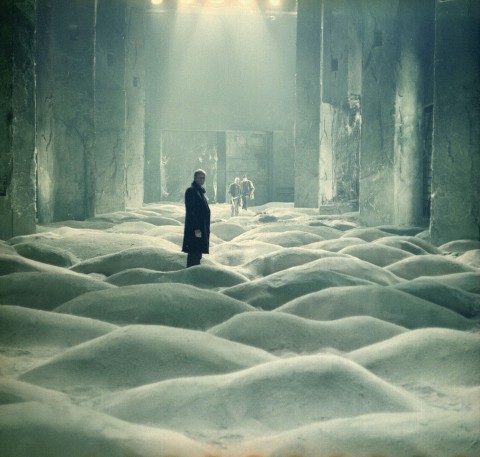北海道鐵路事故不斷 前社長跳海自盡
【國際中心/綜合外電報導】北海道鐵路公司最高顧問坂本真一(73歲),15日跳海自殺。 曾擔任北海道鐵路公司社長及董事長的坂本,今日清晨被家人發現離家失蹤,並留下遺書。北海道警察本部,出動大批警察分頭尋找,當地時間15日上午8時20分,北海道余市町附近的港灣內,海上自衛隊員發現一具浮屍。打撈後證實是坂本真一。
北海道鐵路公司是北海道最大的企業之一,經營北海道主要鐵路幹線,但是,北海道鐵路公司近年不斷鬧出列車起火燃燒,軌道超標彎曲等安全問題,因此被國土交通省追究企業的經營責任。2011年9月,當時擔任公司社長的中島尚俊(64)同樣跳海自殺。
北海道鐵路公司是北海道最大的企業之一,經營北海道主要鐵路幹線,但是,北海道鐵路公司近年不斷鬧出列車起火燃燒,軌道超標彎曲等安全問題,因此被國土交通省追究企業的經營責任。2011年9月,當時擔任公司社長的中島尚俊(64)同樣跳海自殺。
http://en.wikipedia.org/wiki/Andrei_Tarkovsky
Andrei Tarkovsky

Tarkovsky Films Now Free Online
Andrei Arsenyevich Tarkovsky (Russian: Андре́й Арсе́ньевич Тарко́вский, IPA: [ɐnˈdrʲej ɐrˈsʲenʲjɪvʲɪt͡ɕ tɐrˈkofskʲɪj]; 4 April 1932 – 29 December 1986) was a Soviet and Russian film-maker, writer, film editor, film theorist, theatre and opera director.Tarkovsky's films include Ivan's Childhood, Andrei Rublev, Solaris, The Mirror, and Stalker. He directed the first five of his seven feature films in the Soviet Union; his last two films, Nostalghia, and The Sacrifice, were produced in Italy and Sweden, respectively. His work is characterized by spirituality and metaphysical themes, long takes, lack of conventional dramatic structure, and distinctively authored use of cinematography.
 Andrei
Tarkovsky (1932-1986) firmly positioned himself as the finest Soviet
director of the post-War period. But his influence extended well beyond
the Soviet Union. The Cahiers du cinéma consistently ranked his films on their top ten annual lists.
Ingmar Bergman went so far as to say, “Tarkovsky for me is the greatest
[director], the one who invented a new language, true to the nature of
film, as it captures life as a reflection, life as a dream.” And Akira
Kurosawa acknowledged his influence
too, adding, “I love all of Tarkovsky’s films. I love his personality
and all his works. Every cut from his films is a marvelous image in
itself.”
Andrei
Tarkovsky (1932-1986) firmly positioned himself as the finest Soviet
director of the post-War period. But his influence extended well beyond
the Soviet Union. The Cahiers du cinéma consistently ranked his films on their top ten annual lists.
Ingmar Bergman went so far as to say, “Tarkovsky for me is the greatest
[director], the one who invented a new language, true to the nature of
film, as it captures life as a reflection, life as a dream.” And Akira
Kurosawa acknowledged his influence
too, adding, “I love all of Tarkovsky’s films. I love his personality
and all his works. Every cut from his films is a marvelous image in
itself.”Shot between 1962 and 1986, Tarkovsky’s seven feature films often grapple with metaphysical and spiritual themes, using a distinctive cinematic style. Long takes, slow pacing and metaphorical imagery – they all figure into the archetypical Tarkovsky film. (Watch the scene from Stalker above.)
You can now watch Tarkovsky’s films online – for free. Each film is listed in our collection of Free Online Movies, but here you can access each major film in the order in which they were made. Most all of the films below were placed online by Mosfilm, the largest and oldest studion in Russia.
NOTE: if you access the films via YouTube, be sure to click “CC” at the bottom of the videos to access the subtitles.
- Ivan’s Childhood – Web – Buy DVD (1962)
- Andrei Rublev- Part 1 – Part 2 – Buy DVD (1966)
- Solaris - Part 1 - Part 2 - Buy DVD (1972)
- The Mirror - Web – Buy DVD (1975)
- Stalker - Part 1 – Part 2 - Buy DVD (1979)

'Zona'
By GEOFF DYER
Reviewed by J. HOBERMAN
Geoff Dyer examines "Stalker," Andrei Tarkovsky's Soviet-era cinematic masterpiece.
- Nostalghia - Part 1 - Part 2 – Part 3 - Buy DVD (1983)
- Three Student Films by Tarkovsky – Web
- The Killers, 1956
- There Will Be No Leave Today, 1958
- The Steamroller and the Violin, 1960
Related Content:
The Masterful Polaroid Pictures Taken by Filmmaker Andrei Tarkovsky
Tarkovsky’s Advice to Young Filmmakers: Sacrifice Yourself for Cinema
A Poet in Cinema: Andrei Tarkovsky Reveals the Director’s Deep Thoughts on Filmmaking and Life
沒有留言:
張貼留言